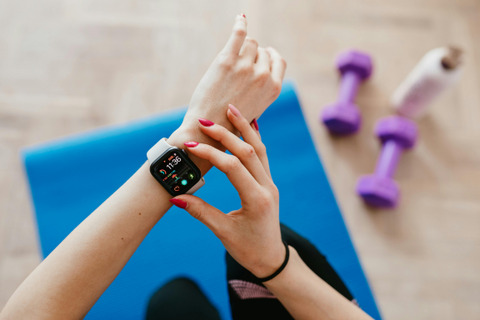
The Morning Hydration Routine
Your first health decision of the day should be simple: drink water. After hours of sleep, your body wakes up slightly dehydrated, and a glass of water immediately helps your metabolism, focus, and digestion. Some studies suggest that drinking water first thing can improve alertness and even reduce overeating later in the day since people often confuse thirst with hunger. Aim for at least 12 to 16 ounces when you wake up. This one-minute act sets the tone for a healthier day and requires zero equipment, just commitment.
Water also plays a big role in how your skin looks and feels. Proper hydration helps maintain elasticity, supports collagen production, and flushes out toxins that can contribute to dullness and breakouts. While drinking water will not erase wrinkles, it gives your skin the moisture balance it needs to stay supple and radiant. Think of it as skincare from the inside out.
Morning Sunshine Benefits
Getting a little sunshine first thing in the morning does more than just feel nice—it actually resets your body’s internal clock. Early light exposure helps regulate your circadian rhythm, which improves sleep quality, boosts daytime energy, and stabilizes mood. Sunlight also triggers serotonin production, the “feel-good” hormone that enhances focus and reduces stress. Plus, it gives you a natural dose of vitamin D, supporting immune function and bone health. Just 10 to 15 minutes of morning light can make a noticeable difference in how balanced and awake you feel all day.
The Five Minute Daily Movement Habit
Good health does not require marathon workouts. What it does require is movement—every single day. Setting aside just five minutes for intentional movement is enough to create consistency. You can stretch, do bodyweight squats, pushups, or take a brisk walk around your house or garden. Linking this mini workout to an existing routine, like after your morning coffee, helps it stick.
Even brief bursts of movement improve blood flow, boost mood, and build long-term strength. While five minutes is a solid start, try adding longer or more intense sessions two or three times per week. Think of the short daily habit as your baseline and the longer workouts as bonus investments in your future health.
The Mindful Meal Prep Boundary
Creating a simple routine around nutrition is less about restrictive dieting and more about planning to avoid bad decisions. Healthy eating is much easier when you plan ahead. Set aside one hour a week to prepare a few staples like chopped vegetables, cooked grains, or lean proteins. This small effort prevents the “what should I eat?” panic that often leads to takeout or unhealthy snacks.
Equally important is how you eat. Make it a rule to enjoy at least one meal a day without screens or distractions. Eating mindfully helps you notice fullness cues sooner, improves digestion, and allows you to actually taste your food. Over time, this simple habit can transform your relationship with eating and reduce the stress that often surrounds it.
The Digital Sunset and Sleep Preparation
Quality sleep is fundamental to long term health, yet it is often the first thing to be compromised by busy schedules and device use. The digital sunset routine is essential for preparing your mind for rest. Implement a strict rule to put away all screens, including phones and tablets, at least 60 minutes before your intended bedtime. The blue light emitted by these devices suppresses melatonin, the hormone that regulates sleep. Replace this screen time with a calming, analog activity such as reading a physical book, light stretching, or journaling. This routine cues your nervous system that it is time to slow down, allowing your natural sleep cycle to take over efficiently. Consistent sleep preparation is the single most powerful tool for boosting your physical and mental recovery.
The One Minute Reflection Practice
Mental health often gets overlooked in daily wellness routines, but it is as vital as nutrition or exercise. End your day with one minute of reflection. Ask yourself two simple questions: What went well today? What did I learn? This quick check-in helps shift your focus from stress to growth and teaches your brain to recognize progress.
If you miss a day, that is fine. What matters most is returning to it the next day. Like all habits, reflection becomes easier and more meaningful the more you practice it. Over time, this moment of pause can lower stress, improve self-awareness, and strengthen emotional resilience.
The Power of Emotional Connection
Emotional connection is one of the deepest human needs and a major pillar of long term well-being. Sharing genuine feelings, being understood, and offering support to others reduce loneliness and create a sense of belonging that technology or surface-level interaction cannot replace. Research shows that strong emotional bonds lower stress hormones, improve heart health, and even boost immune function. Whether it is through conversation, laughter, or quiet companionship, meaningful connection reminds you that you are not alone, and that simple truth has powerful healing effects on both mind and body.
FAQs About Building Healthy Habits
How long does it take for a routine to feel automatic?
It varies for everyone, but research shows it can take anywhere from 18 days to 254 days, with the average around 66. What matters most is showing up daily, not how quickly it feels natural.
What should I do if I miss a day?
Do not let one missed day become two. The rule of thumb is “never miss twice.” Just pick it back up the next day and keep moving forward.
Is a five-minute workout really enough?
Yes—for building consistency. Daily micro-workouts keep your body active and your mindset strong. Still, aim for two or three longer sessions each week to strengthen your heart and muscles.
Why is hydration mentioned first?
Hydration affects energy, focus, and even mood. Starting your day with water makes it easier to stick to other healthy habits throughout the day.
In a world where everyone is chasing the next big wellness hack, the truth is much simpler. When you are new to making health changes, the idea of a complete lifestyle change can feel overwhelming, leading many people to give up before they even start. But luckily, real, lasting health comes from small, consistent actions that are easy to repeat every day, You do not need a total lifestyle overhaul or a color-coded schedule to feel better. What you need are consistent, simple routines that become automatic. By focusing on manageable habits, you remove the need for willpower and build a foundation that supports both physical and mental well-being over time.
When people try to change everything at once, they often burn out before seeing results. Experts agree that massive change is rarely sustainable. Instead, steady repetition is what creates transformation. On average, it takes about two months for a new behavior to feel natural, but consistency matters far more than speed. The goal is not perfection, but daily action. We are going to focus on foundational habits related to movement, nutrition, and mental space that, when done faithfully every day, compound into massive improvements over time
The Morning Hydration Routine
Your first health decision of the day should be simple: drink water. After hours of sleep, your body wakes up slightly dehydrated, and a glass of water immediately helps your metabolism, focus, and digestion. Some studies suggest that drinking water first thing can improve alertness and even reduce overeating later in the day since people often confuse thirst with hunger. Aim for at least 12 to 16 ounces when you wake up. This one-minute act sets the tone for a healthier day and requires zero equipment, just commitment.
Water also plays a big role in how your skin looks and feels. Proper hydration helps maintain elasticity, supports collagen production, and flushes out toxins that can contribute to dullness and breakouts. While drinking water will not erase wrinkles, it gives your skin the moisture balance it needs to stay supple and radiant. Think of it as skincare from the inside out.
Morning Sunshine Benefits
Getting a little sunshine first thing in the morning does more than just feel nice—it actually resets your body’s internal clock. Early light exposure helps regulate your circadian rhythm, which improves sleep quality, boosts daytime energy, and stabilizes mood. Sunlight also triggers serotonin production, the “feel-good” hormone that enhances focus and reduces stress. Plus, it gives you a natural dose of vitamin D, supporting immune function and bone health. Just 10 to 15 minutes of morning light can make a noticeable difference in how balanced and awake you feel all day.
The Five Minute Daily Movement Habit
Good health does not require marathon workouts. What it does require is movement—every single day. Setting aside just five minutes for intentional movement is enough to create consistency. You can stretch, do bodyweight squats, pushups, or take a brisk walk around your house or garden. Linking this mini workout to an existing routine, like after your morning coffee, helps it stick.
Even brief bursts of movement improve blood flow, boost mood, and build long-term strength. While five minutes is a solid start, try adding longer or more intense sessions two or three times per week. Think of the short daily habit as your baseline and the longer workouts as bonus investments in your future health.
The Mindful Meal Prep Boundary
Creating a simple routine around nutrition is less about restrictive dieting and more about planning to avoid bad decisions. Healthy eating is much easier when you plan ahead. Set aside one hour a week to prepare a few staples like chopped vegetables, cooked grains, or lean proteins. This small effort prevents the “what should I eat?” panic that often leads to takeout or unhealthy snacks.
Equally important is how you eat. Make it a rule to enjoy at least one meal a day without screens or distractions. Eating mindfully helps you notice fullness cues sooner, improves digestion, and allows you to actually taste your food. Over time, this simple habit can transform your relationship with eating and reduce the stress that often surrounds it.
The Digital Sunset and Sleep Preparation
Quality sleep is fundamental to long term health, yet it is often the first thing to be compromised by busy schedules and device use. The digital sunset routine is essential for preparing your mind for rest. Implement a strict rule to put away all screens, including phones and tablets, at least 60 minutes before your intended bedtime. The blue light emitted by these devices suppresses melatonin, the hormone that regulates sleep. Replace this screen time with a calming, analog activity such as reading a physical book, light stretching, or journaling. This routine cues your nervous system that it is time to slow down, allowing your natural sleep cycle to take over efficiently. Consistent sleep preparation is the single most powerful tool for boosting your physical and mental recovery.
The One Minute Reflection Practice
Mental health often gets overlooked in daily wellness routines, but it is as vital as nutrition or exercise. End your day with one minute of reflection. Ask yourself two simple questions: What went well today? What did I learn? This quick check-in helps shift your focus from stress to growth and teaches your brain to recognize progress.
If you miss a day, that is fine. What matters most is returning to it the next day. Like all habits, reflection becomes easier and more meaningful the more you practice it. Over time, this moment of pause can lower stress, improve self-awareness, and strengthen emotional resilience.
The Power of Emotional Connection
Emotional connection is one of the deepest human needs and a major pillar of long term well-being. Sharing genuine feelings, being understood, and offering support to others reduce loneliness and create a sense of belonging that technology or surface-level interaction cannot replace. Research shows that strong emotional bonds lower stress hormones, improve heart health, and even boost immune function. Whether it is through conversation, laughter, or quiet companionship, meaningful connection reminds you that you are not alone, and that simple truth has powerful healing effects on both mind and body.
FAQs About Building Healthy Habits
How long does it take for a routine to feel automatic?
It varies for everyone, but research shows it can take anywhere from 18 days to 254 days, with the average around 66. What matters most is showing up daily, not how quickly it feels natural.
What should I do if I miss a day?
Do not let one missed day become two. The rule of thumb is “never miss twice.” Just pick it back up the next day and keep moving forward.
Is a five-minute workout really enough?
Yes—for building consistency. Daily micro-workouts keep your body active and your mindset strong. Still, aim for two or three longer sessions each week to strengthen your heart and muscles.
Why is hydration mentioned first?
Hydration affects energy, focus, and even mood. Starting your day with water makes it easier to stick to other healthy habits throughout the day.

The key to long-term health is not radical change but steady rhythm. Securing long term health is also not about finding the perfect diet or spending excessive time exercising. When you hydrate, move, eat mindfully, disconnect from screens, connect with others, and reflect each day, you build a system that supports every part of your body and mind. These small actions take minutes, but their impact compounds with time.
You do not need expensive equipment or perfect motivation. You only need to start, and keep starting, every day. These simple routines may seem small, but together they form the backbone of a healthier, calmer, and more fulfilled life. Remember that consistency is your greatest asset. By committing to these small actions every single day, you reduce the need for willpower and harness the compounding power of good habits. Do not wait for a perfect time or motivation; start small, start today, and watch these simple routines transform your health trajectory over time.
Related posts




